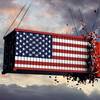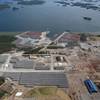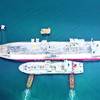Rick Calhoun, President of Cargo Carriers (Cargill) and Chairman of Waterways Council, Inc., released the following statement today regarding the state of emergency on the Lower Mississippi River:
“The inland waterways navigation system is the most important transportation asset in the United States and is vital to the economic well-being of this country. From the inception of this country, the Federal government has played a critical role in ensuring that the inland navigation system, including the Mississippi River, remains open to transport products such as grain, coal, steel, petroleum and aggregate materials. We urgently call on the Federal government today to take all necessary steps to provide funding for this national transportation asset and to allow the Lower Mississippi River to remain fully open for commerce.
This year, we have seen unprecedented levels of high water on the Mississippi River carrying millions of tons of silt and debris to the mouth of the River. As water levels begin to recede, an emergency situation has developed with significant silting and shoaling at the River’s mouth that imminently threatens the ability of vessels to enter and exit the river.
The President has announced his intention to double exports in the next five years, but without a viable Mississippi River there will be no possible way to reach that goal. Commerce to and from 38 states moves throughout the port complex in south Louisiana. Coal from West Virginia, corn from Iowa, fertilizer from Florida, petroleum products from Texas, and aggregate materials from Arkansas are transported through these ports.
More than 6,000 ocean-going vessels and more than 450 million tons of cargo move through the mouth of the Mississippi River annually.
This silting may soon result in restrictions being imposed for ships and vessels that rely on this passageway to export products to the world market out of ports in south Louisiana. Dredging of this critical artery must happen now, but there is a shortfall of funds to do so. We urge the White House to immediately submit an emergency request for supplemental funds to Congress, and we ask that Congress expeditiously process that request for Emergency Supplemental Appropriations funding. Dredging this critical artery should be viewed as an investment, not a cost, in the future of our vital inland waterways transportation system.
As our Nation continues to struggle to return to economic prosperity, we simply cannot ignore the necessity of our ports and waterways in keeping America strong.”










